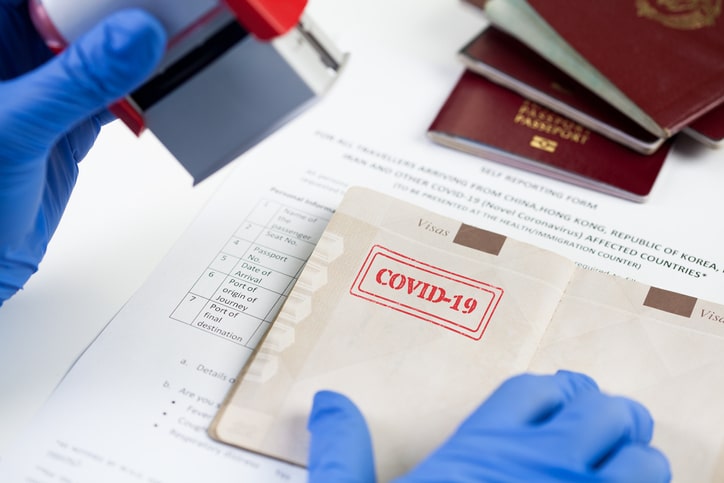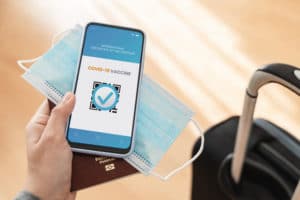If you are a global nomad that country-hops whilst working from a laptop, then the coronavirus pandemic will have significantly altered your international lifestyle. Most countries closed their borders months ago to stop the spread of the virus and there are signs that international travel will only reignite with a Covid-19 passport.
Keep in mind that the whole subject of a COVID or vaccine passport or visa is quite contentious and controvercial. We are not taking a side on this issue, but we accept that many countries will want some proof of vaccination for COVID before accepting you into their country. In fact, several nationals already do require a vaccination certification for COVID-19. So what is a Covid-19 passport? How do they work? Have they ever been used before? And what do expats need to know about getting one?
What to know about a Covid-19 passport?
1. What is a vaccination passport? How will the Covid-19 passport work?
A vaccination passport is a document that shows you have tested negative or have been vaccinated against a particular infection (such as Covid-19).
The passport is in its inception stages so the format might be different between countries depending on the technology each chooses to use. Some places, such as Israel give their vaccinated citizens a QR code which is scanned. Other countries are using a ‘health’ app or Bluetooth to access a person’s medical records. Whether an international system will be successfully designed and employed is not yet known.
But many companies are under the pump trying to find a worldwide-friendly Covid-passport and one of these companies is the International Air Transport Association (IATA). Nick Careen, the lead for the travel pass initiative at IATA explains they just want to make “it easier for people to travel between countries without having to pull out different papers for different countries and different documents at different checkpoints.” It is hoped a digital medical document would streamline border control when traveling and make everyone’s lives easier.
2. Are vaccine passports new?
Immunity passports are not new. The Yellow Fever booklet, which shows if a traveler has been vaccinated against the Yellow Fever virus has been around for a while. Smallpox, rubella, and cholera vaccine-passports exist as well. Proving you have been vaccinated against a particular virus is a way for a country to protect its citizens before allowing streams of unvaccinated tourists to enter their country who could be carrying or could contract the virus and fall ill.
3. Why would expats need a Covid-19 passport?
Coronavirus has ravaged the world and caused nearly three million deaths and rendered millions chronically ill with Long Covid . Many hospitals have been at breaking point for nearly a year and people have lost jobs and incomes. Therefore, before countries start opening borders and risk the virus spreading, many governments want to know if an expat has been vaccinated or alternatively, has recently tested negative for the virus.
The purpose of Covid-19 passports is to mitigate the spread of the virus and eliminate the need for quarantine facilities on arrival into a country (which renders travel inefficient and costly).
4. What are some issues raised by a Covid-19 passport?
Vaccine passport-advocates argue inoculation is someone’s duty if they want to reap the rewards of being a global nomad. Others view mandatory vaccination as a violation of personal liberty and don’t think they should be punished for their choices.
Ana Beduschi, an associate professor of law at the University of Exeter told Aljazeera that vaccine passports could potentially be discriminatory. “Imagine, for example” he explains, “the case of a pregnant woman who cannot be vaccinated and cannot afford to pay for private Covid-19 tests – she may be excluded from a variety of places and activities.”
There are also major concerns over privacy and data sharing of medical data. Evernym, a software company, points out it will probably take a long time to find a tech solution that can work in every airport and for every individual around the globe. Drummond Reed, chief trust officer for Evernym, says “the global passport system took 50 years to develop” and now the world needs to produce a digital pass that works universally “and it needs an even greater level of privacy because it’s going to be digital.”
Don’t Forget About Global Healthcare
Finally, keep in mind that if you plan to move abroad or already living as a global nomad, it is quite vital to buy an international health insurance policy that will cover you globally and not exclude COVID-19. Many countries are requiring expats to be covered by a global health policy that will not exclude COVID.




